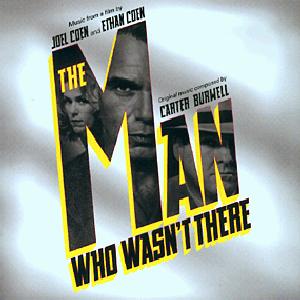Carter BURWELL
The Man Who Wasn’t There
orchestrated and conducted by the composer
OST DECCA 016 019-2 [45:49 - score: 16:11 * classical works: 29:40]

Extracts from Piano Sonatas No. 8 "Pathétique", No. 14 "Moonlight", No. 23 "Appassionata" & No. 25, plus Andante cantabile from Piano Trio No.7, "Archduke". Also included Mozart's "Che soave zeffiretto" from The Marriage of Figaro.
Anyone buying this album for Carter Burwell's score, rather than as a general souvenir of the Cohen brothers' film should be very aware that it contains just 16 minutes of music by the composer. This is divided into seven cues, interspersed with almost twice as much music extracted from Beethoven piano works and a Mozart opera aria. The classical pieces are of course great music, but given that the album only provides the parts used in the film, and that some of these run little more than a minute, anyone looking for Beethoven would be better rewarded purchasing a good recording of the complete works. That said, the final track on the disc, the Andante cantabile from the Piano Trio No.7, "Archduke" runs for over thirteen minutes and is by far the most substantial offering here, greatly overshadowing Burwell's own score. One final note on the classical music; the Beethoven sonatas are newly recorded by Jonathan Feldman, while the Trio No. 7 comes from a 1980 recording with the Beaux Trio and the Mozart duet from The Marriage of Figaro is taken from a 1968 recording with Karl Böhm conducting the orchestra of the German Opera, Berlin with Edith Mathis and Gundula Janowitz.
As for the score… well what there is blends elegantly with the Beethoven. "I Met Doris Blind" plays just 75 seconds and immediately introduces the refined, eloquent main theme on unison strings, piano joining at the 45 second mark. "Ed Visits Dave" runs 62 seconds and is a less melodic atmosphere cue for string orchestra, while the 40 second "I Love You Birdy Abundas!" simply offers a short variation on the central theme. "Nirdlinger's Swing" is an entirely different proposition, an expert five minute pastiche of 1940's big band swing. Tuneful, exciting and containing hot drum, trumpet and clarinet solos, it is very much the odd track out. "The Fight" is a three minute slow building mood-suspense piece which works well but which is far from essential. "The Bank is a further 62 seconds of variation on the main theme, this time with more impassioned piano. Finally, "The Trial of Ed Crane" provides a heartfelt apotheosis, again a version of the central melody though this time featuring a central solo piano section.
Given the small amount of score this album, and the best of that being essentially variations on a single theme, this is a release for the very dedicated Carter Burwell fan or anyone intent on a memento of the movie. General film music fans may well be disappointed, while classical music lovers should head straight for the Beethoven racks. As such while this is an enjoyable disc it is difficult to recommend.
Gary S. Dalkin

Return to Index